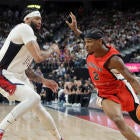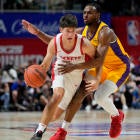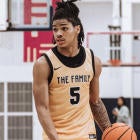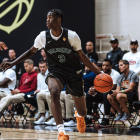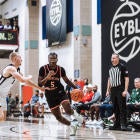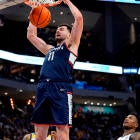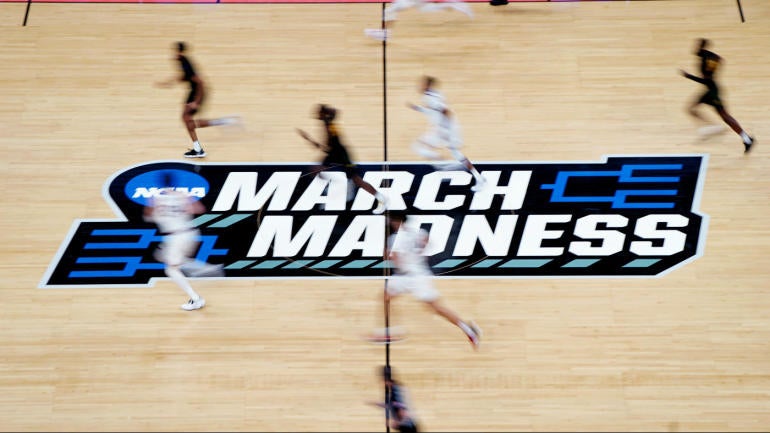
Well, are you satisfied with your bracket? Or is it brackets? Are you a person of principle, someone who lives by a single set of picks ... or do you prefer to live your life as a charlatan, just submitting two dozen different entries and living in the multiverse?
Hey: I love it either way. You're here, and so is the NCAA Tournament. It's the best time of the year on the sports calendar. And as always, I've got my annual stats-and-goodies post for you to peruse through.
Below, I've cobbled together a mini mountain of facts, stats, trends, scoops, did-you-knows and more that will either help you win your pool or destroy your weekend. Either way, it'll be a blast.
In addition to my own research, all additional info is provided by CBS Sports' research team, the NCAA, KenPom.com, ESPN Stats & Info, Elias Sports, Sports Reference and BartTorvik.com. I love putting this thing together each year. Dive in and pick your favorites.
- Highest-scoring team: Gonzaga (87.5 points per game)
- Lowest-scoring team: Northwestern (67.7 points per game)
- Fastest team: Arizona (72.9 possessions per game)
- Slowest team: Virginia (62.4 possessions per game)
- Best free-throw shooting team: Texas A&M Corpus-Christi (79.9%)
- Worst free-throw shooting team: Colgate (65.9%)
- Best 3-point shooting team: Colgate (40.9%)
- Worst 3-point shooting team: Texas Southern (29.1%)
- Most experienced team(s): Penn State (4.01 average seasons)
- Least experienced team: Fairleigh Dickinson (.62 average seasons)
- Tallest team: Duke (average height 79.3 inches)
- Smallest team: Fairleigh Dickinson (73.4 inches)
- Deepest bench: TCU and FAU (39.0% of minutes played)
- Thinnest bench: Kansas (18.1%)
Most efficient offenses, adjusted points scored per 100 possessions:
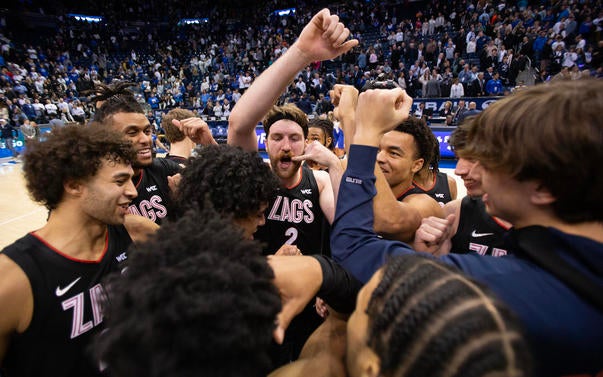
Most efficient defenses, adjusted points allowed per 100 possessions:
Over the years, teams that have won it all have checked a lot of boxes. You can make the stats tell you a lot of things you want to hear. But if you've got a top-30 per-possession D and a guard/wing that's safely projected to be drafted, you've got a solid shot. Only a handful of teams meet this criteria each year. This tournament is more populated: 10 apply, one of which has two such players.
- UCLA: 1st (Jaime Jaquez Jr.)
- Tennessee: 2nd (Julian Philips)
- Alabama: 3rd (Brandon Miller)
- Houston: 4th (Marcus Sasser)
- Kansas: 7th (Gradey Dick)
- Texas: 11th (Dillon Mitchell)
- Creighton: 15th (Trey Alexander)
- Arkansas: 16th (Nick Smith Jr., Anthony Black)
- Connecticut: 18th (Jordan Hawkins)
- Duke: 24th (Dariq Whitehead)
- Best scorer: Purdue's Zach Edey (22.3 points per game)
- Best rebounder: Kentucky's Oscar Tshiebwe (13.1 boards per game)
- Best assist man: Marquette's Tyler Kolek (7.7 dimes per game)
- Best 2-point shooter: Creighton's Ryan Kalkbrenner (74.3%)
- Best 3-point shooter: Colgate's Oliver Lynch-Daniels (50.3%)
- Best foul shooter: Iona's Walter Clayton (95.1%)
- Best thief: Kent State's Malique Jacobs (2.7 steals per game)
- Best shot-blocker: Oral Roberts' Connor Vanover (3.3 per game)
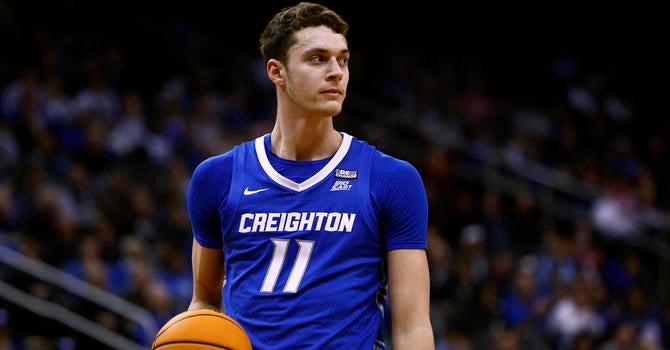
84: This is the 84th NCAA Tournament. Thirty-seven programs have won a national title dating to 1939, when Oregon won its only championship. None of the teams from the first Final Four are in the field this year: Ohio State, Oklahoma, Oregon and Villanova all missed out. That hasn't happened since 2004.
0: The Alabama Crimson Tide, Houston Cougars, Purdue Boilermakers and Texas Longhorns are the best-seeded teams in the field without a national title.
22.7%: The percentage of brackets at CBS Sports that have Alabama winning it all. Second is Houston at 13.8%, Kansas is third at 13.1%.
17.6: Houston's percentage to win the title, according to BartTorvik.com. Gonzaga was a whopping 27.6% a year ago, and the undefeated team in 2021 was 33.3%. The top five for this year: Gonzaga, Alabama (14.2%), UCLA (8.5%), Tennessee (6.9%), Purdue (6.8%).
1: Only three times has the No. 1 overall seed won the NCAA Tournament since the selection committee began ranking the No. 1 in 2004: Florida (2007), Kentucky (2012) and Louisville (2013). The No. 1 overall seed has also lost in the second round thrice -- and the first round once. (UMBC forever.) Alabama is this year's No. 1 overall seed. Alabama joins 2006-07 Florida as the only teams to be the No. 1 overall seed in the same year they got a 1-seed for the first time in school history.
14: Kansas, Texas and Alabama have 14 wins against teams in the field, the most of all dancers. Teams with no wins against 2023 tournament teams: Colgate, Fairleigh Dickinson, Furman, Howard, Kennesaw State, Louisiana, Montana State, Northern Kentucky, Princeton, Texas A&M-Corpus Christi, SEMO, UCSB, UNC Asheville.
17: Purdue leads the field with 17 victories against top-50 KenPom teams.
3: Just two times since 2011 the WAC has sent a team not named New Mexico State to the NCAAs. Grand Canyon's there this year, and NMSU canceled its season in February after intra-roster abuse allegations surfaced.
0: Infamously, no team has lost its first conference tournament game and then won a national title. This year, you should be suspicious of Baylor, Kansas State and Kentucky. They are the teams seeded sixth or better that were one-and-done in their league tourneys. (Additionally, every national champion since 1985 has made it minimally to the semifinals of their league tournament, if their league staged a tournament the year they won it all.)
13 of 24: In the past 24 tournaments, 13 national champions won their conference tournament. Since 1985, 16 national champions have won their league tournaments. There is no pattern at play here.
31 and 3: Houston has the most wins (31) vs. Division I competition. Houston, Charleston and FAU have the fewest losses (3).
20: Texas Southern's 20 losses are the most in the field. It's the third time a team with 20 or more losses has danced. (Liberty in 2013, Coppin State in 2018.)
49: It's been 49 years since Furman won an NCAA Tournament game, the longest drought for any team in the field that has previously made the tournament. Among Big Six teams in the field, the school with the longest drought since its last NCAA Tournament win is Penn State (2001). Additionally, Boise State has been D-I since '70 and never won a tournament game. This is its ninth tournament.
7-0: Purdue, Arizona and Drake own the best neutral-court record in college basketball this season at 7-0.
2/24: San Diego State and Arkansas faced the fewest Quad 4 teams of all (2). Kansas played 24 Quad 1 foes, the most of anyone in the tournament and the most in a single season ever, and went 17-7 in those games.
-22.5: Alabama's line vs. Texas A&M-Corpus Christi is the biggest of the first round. Here's every line for every Thursday and Friday game.
Get every pick, every play, every upset and fill out your bracket with our help! Visit SportsLine now to see which teams will make and break your bracket and who will cut down the nets, all from the model that beat over 92% of all CBS Sports brackets in two of the last four tournaments.
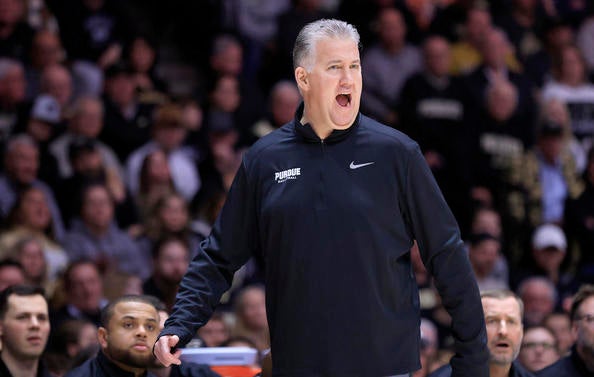
10: Coaches with top-four seeds to never have made a Final Four as a coach. I think at least one of these guys gets there.
- Nate Oats (Alabama)
- Matt Painter (Purdue)
- Tommy Lloyd (Arizona)
- Rodney Terry (Texas)
- Mike Woodson (Indiana)
- Sean Miller (Xavier)
- Jerome Tang (Kansas State)
- Dan Hurley (UConn)
8 for 12: In eight of the past 12 NCAA Tournaments, at least one 13-seed has defeated a No. 4. The most popular No. 13-over-No. 4 pick at CBSSports.com/on the CBS Sports app: Kent State. (17%).
143-1: No. 1 seeds are 147-1 all time vs. 16s. The No. 2s are 138-10 against 15s.
6 or fewer: It took UMBC 33 years to become the first No. 16 seed to win. When will we see it again? Seven times a 16-seed has finished a game within six points or fewer of a No. 1 seed. Those results were: 2013 Southern vs. Gonzaga (64-58); 1996 Western Carolina vs. Purdue (73-71); 1990 Murray State vs. Michigan State (75-71 in OT); 1989 McNeese State vs. Illinois (77-71); 1989 East Tennessee State vs. Oklahoma (72-71); 1989 Princeton vs. Georgetown (50-49); and 1985 Fairleigh Dickinson vs. Michigan (59-55).
5 or lower: This is a 🚨🚨🚨 for your bracket: Every NCAA Tournament since 2013 has had a No. 5 seed or lower reach the Final Four.
2016: The last time all four No. 1 seeds reached the Elite Eight. Before that, it was 2009.
2009: The last and only other time one conference had as many as three No. 1 seeds. It was the Big East; Pitt, UConn and Louisville all did it. This year, top seeds hail from the Big 12, SEC, Big Ten and the American.
2008: Famously, the only time all four No. 1s reached the Final Four. But since 2010, only 16 of the 48 Final Four appearances have come from No. 1 seeds.
1-4: You almost never wanna go all chalk at the top in the first round. In 2017, all No. 1s 2s, 3s and 4s won their first-round game. Prior to that, the last time that happened was 2007. It's happened just six times since 1985.
60 vs. 53: No. 1 seeds have made the Final Four 60 times. That's narrowly more than the combined Final Four showings of No. 4-16 since seeding began (53).
No. 2: Only two times in the past 25 NCAA Tournaments have all four No. 2 seeds made the Sweet 16. It's happened just five times since 1985: '89, '95, '96, '09, '19. Pick at least one No. 2 to lose early. It's probably going to happen. Kentucky and Auburn got got in 2022.
12: Every seed, from No. 1 to No. 11, has made a Final Four. When does a No. 12 do it? This year the options are exclusively mid-major: Charleston, Kent State, Drake and Oral Roberts.
7: Though 7/10 games feel a bit like 8/9 games, they're not. No. 10s have never swept the 7s with the exception of one year (1999). No. 8 seeds are 72-76 vs. 9-seeds all time.
10>8+9: You're more likely to make the Sweet 16 as a No. 10 seed than as either an 8 or 9. No. 10s are 19-34 vs. No. 2 seeds, while 9-seeds are 15-58 and 9s are 6-68 vs. top seeds. Breaking down the math further: 10-seeds historically have a 16.2% chance of making the Sweet 16, while the combined chances for No. 8s and No. 9s is 14.8%. Seeding matters. A 7-seed has made it to the Sweet 16 28 times since 1985. Contrast that to a No. 8, which has only gotten there 15 times.
6-11: In the past 11 NCAA Tournaments, teams seeded No. 5 or No. 6 that enter the tourney being ranked outside the top 30 at KenPom have a 6-11 record. Fourth-seeded UVA and No. 5 Miami fall into this category this year.
67.1-to-1: Per bracketodds.com's calculator, those are the chances we'll have four No. 1 seeds reach the 2023 Final Four. If you go to all No. 2s, it's 375.1-to-1. Two 1s and two 2s is 25.7-to-1.
9,223,372,036,854,775,808: The number of different possible bracket outcomes. Wondering how to pronounce that number? I got you. That would be nine quintillion, two hundred twenty-three quadrillion, three hundred seventy-two trillion, thirty-six billion, eight hundred fifty-four million, seven hundred seventy-five thousand, eight hundred eight. It's much larger than the number of possible outcomes seen by Doctor Strange in Avengers: Infinity War.
8: The Big Ten and SEC's eight bids lead all conferences.
37: Oklahoma State, 37th at KenPom, is the highest team in that metric to not make the tournament.
38/72: North Texas' No. 38 NET ranking makes it the highest-rated team to not make the field, while Pitt's No. 67 ranking is the lowest of any at-large in this year's field. The NET has existed for five years. Rutgers' 77 ranking is 2022 is the record holder.
22 of 23: A top-three seed has won the national title 22 of the past 23 tournaments.
7: In 10 of the past 11 tournaments, a No. 7 seed or worse has cracked the Elite Eight. Who's doing it this year?
1-34: The Big South has existed since 1986. It's 1-35 all time in the NCAA Tournament. The only win? Winthrop back in 2007. This year's candidate is 15th-seeded UNC Asheville, which plays UCLA in the West.
7 for 16: Gonzaga's made the Sweet 16 in seven straight tournaments. No other team has a streak longer than three. The all-time record is 14 (UCLA 1967-80).
10: The number of coaches who are making their NCAA Tournament debuts. The youngest: Duke's Jon Scheyer (35). The oldest: Jerome Tang (56).
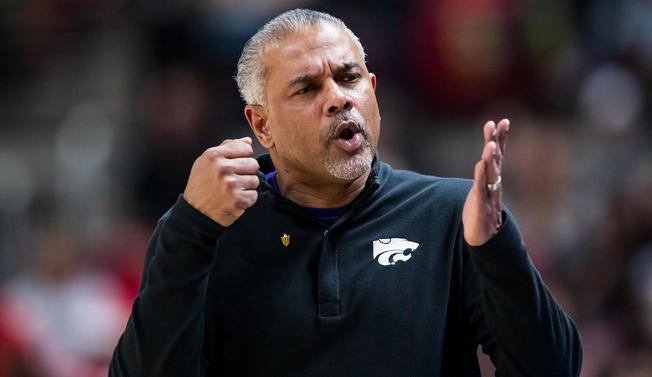
29: It has been 29 years since a No. 6 seed made the Final Four. Who was it? Chris Webber and the Fab Five at Michigan. The highest-rated 6-seed per KenPom is Creighton (13th), which I have going to Houston.
14: Of 68 schools dancing, 11 have won a national title: UCLA, Kentucky, Duke, Indiana, UConn, Kansas, Michigan State, Arizona, Arkansas, Baylor, Marquette, Virginia, Maryland, NC State. A drop-off from last year's record number of 19.
5: The only top-eight seed yet to win a national title is a 5. Go ahead, end the streak, Duke, Miami, San Diego State or Saint Mary's.
37 for 37 in 16: The ACC, having its worst metrics year ever, is hoping to continue a proud trend. The conference has never failed to get at least one team into the Sweet 16 since the field expanded in 1985.
+.152: UNC Asheville rates as the "luckiest" team in the field, per KenPom. In the past 19 NCAA Tournaments, the luckiest team in the field lost its first game 16 times. The unluckiest team this year: Creighton.
20+: There have been three 20-point upsets against the spread in the NCAA Tournament since 1985: No. 15 Santa Clara (+20) over No. 2 Arizona in 1993; No. 15 Norfolk State (+21.5) over No. 2 Missouri in 2012; No. 16 UMBC (+20.5) over No. 1 Virginia in 2018. Corpus Christi is a 22.5-point dog to Alabama and Howard is +22 to Kansas.
27/25: Tennessee coach Rick Barnes will be making his 27th appearance in the NCAAs. He's 25-26 all time. Tennessee as a program has been here two fewer times: 25.
11?: Marquette and Kentucky have met 10 times in the NCAAs, the most common clash in tournament history. If they make it out of the first weekend, matchup No. 11 will happen in the Sweet 16.
2,476: The distance as the crow flies from Princeton University to Sacramento's airport, making the Tigers' trip the longest of any team in the field.
68.8%: Pitt, fresh off a win Tuesday night as an underdog vs. Mississippi State, has the best cover percentage of all NCAA Tournament teams at 68.8%. That's just about nice. FAU and Texas A&M are right behind this season at 67.7%. Virginia's 40% ATS number is the worst in the field.
14: A No. 14 has beaten a No. 3 in five of the past nine NCAA Tournaments. Anyone feeling Montana State?
17: Oral Roberts' 17-game winning streak is longest heading into the Dance.
39-12/.765: Kansas has the best NCAA Tournament record/win percentage since 2008 (minimum of six games played) in the field.
1: The number of teams making an NCAA tourney debut. Welcome to the club, Kennesaw State!
0 for 40: The Northeast Conference is still the only league that has never won a first-round NCAA Tournament game. Fairleigh Dickinson has to beat Texas Southern and THEN Purdue to end the drought. Yeah ... that's not happening.
32: Most consecutive NCAA tourneys: Kansas (33), Michigan State (25), Gonzaga (23). No one else is in double digits. Kansas' Bill Self, absurdly, is coaching his 22nd straight NCAA Tournament as a No. 4 seed or better.
30: Combined national championships for programs in the East Region, the most of the four regions BY FAR. The schools: UCLA (11), Kansas (4), UConn (4), Arkansas (1).
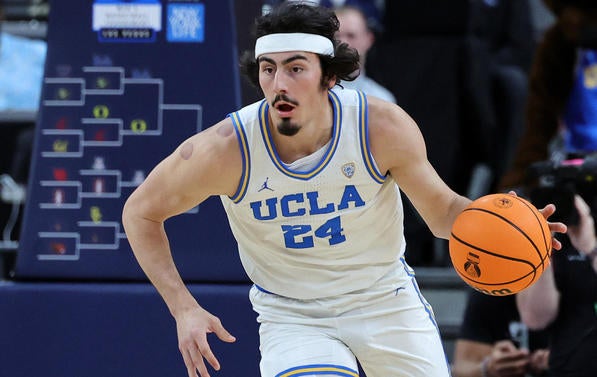
11 or better: Five of the top 11 teams in the West Region are ranked 11th or better at KenPom. UCLA (2), Connecticut (4), Gonzaga (8), Kansas (9) and Saint Mary's (11).
9: School in this NCAA Tournament with the most appearances to never win a game: Boise State (9).
14-over-3 = bad for Big 12: The past four times a No. 3 seed has been upset by a 14-seed, all those games had Big 12 teams on the losing end. This year, Kansas State and Baylor are on the 3-line. (H/T ESPN)
51: A No. 12 seed has won 51 first-round games since the field expanded to 64 teams in 1985. The '88, '00, '07, '15 and '18 tournaments are the only ones since the field expanded to not have a No. 12 seed win. Last year, two did it (Richmond, New Mexico State). In the past 13 tournaments they are 22-30 vs. No. 5s. Don't overlook 11s, though. That's still a real upset, and in the last six tournaments, 11s are 14-10 vs. the No. 6s. The most popular 12-over-5 pick at CBSSports.com/on the CBS Sports app: VCU over Saint Mary's (39%).
.767: Michigan State coach Tom Izzo's winning percentage in the second round and Elite Eight. He is 23-7 in those games (i.e., on a two-day turnaround). Should Michigan State get past USC, it would potentially face No. 2 Marquette. MSU lost last year to second-seeded Duke.
25-17: Since seeding the field began, No. 1 seeds have more national titles (25) than the rest of the seeds combined (17).
10-15: Pick at least one double-digit seed to reach the Sweet 16, because it has happened all but two years since '85 (1995, 2007). And 16 times there have been at least three double-digit seeds that made it to the regional semifinals. In 2021 and 2022, we had four: Oral Robert, Oregon State, Syracuse and UCLA; Saint Peter's, Iowa State, Miami and Michigan. Challenge yourself in your bracket picks. It's going to happen again.
7: Since 1980, there have been seven reigning champions that have made the Final Four the next tournament. It hasn't happened since Florida in 2007, which went a step further and repeated as champs. With Kansas as a No. 1, it's got a fair shot to end the drought ... but it is in the toughest region.
10 for 11: There have been 11 NCAA Tournaments since the First Four's format was introduced. In 10 of those 11 tournaments, a First Four team has won at least two games. VCU (2011) and UCLA (2021) went to the Final Four. Last year it was Notre Dame. Who's pushing through in '23?
+600: Houston's odds to win the whole thing, according to Caesars Sportsbook. Those are relatively long for the shortest favorite in the field. Happy bracketing!









